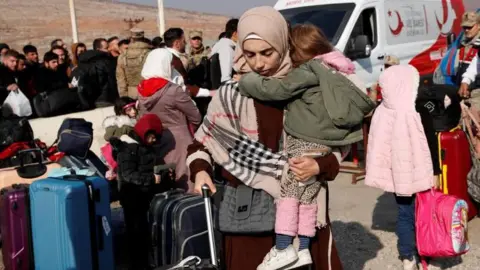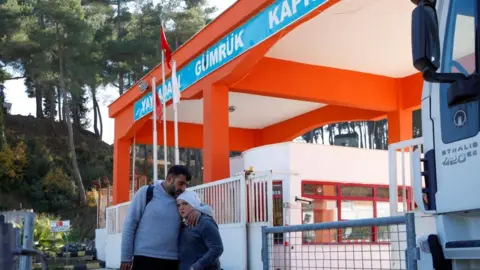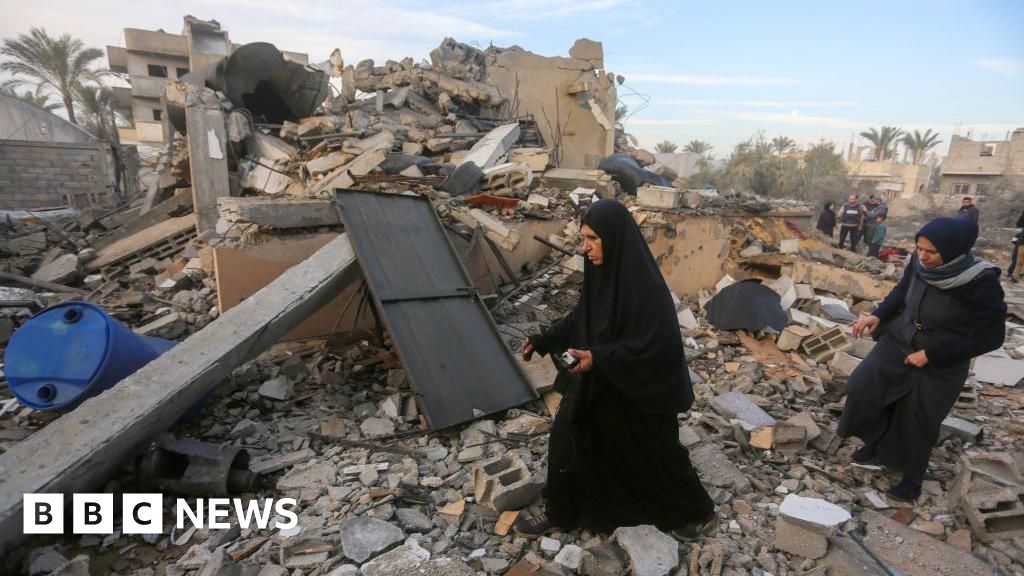ARTICLE AD BOX

 Reuters
Reuters
Syrians have been queuing at the Turkish border in Hatay province to return home
Syrian refugees have been celebrating the fall of Bashar al-Assad in the streets of Turkish cities, welcoming the sudden collapse of his regime, and many are now considering whether they should go back home.
Thousands of Syrians have flocked to Turkey's borders with Syria, and President Recep Tayyip Erdogan has announced the opening of a border gate "to prevent any congestion and ease traffic".
But almost three million Syrians are currently living in Turkey, having fled their country's civil war since it began in 2011, and they will face a difficult decision on what they do next.
"There is still no water in many regions in Syria, electricity comes at certain times of the day. It is not even clear who will govern the country and how, but we need to return to get Syria back on its feet," says Ibrahim, a chemical engineer who has lived for 12 years in Hatay province which borders Syria.
Despite all the risks he is among those Syrian refugees planning to go back as soon as possible, even though they will have to restart their lives from scratch.
- Follow updates: Syrian rebels to name Assad officials wanted for torture
Many Turks are also keen for Syrians to go back as soon as possible and Foreign Minister Hakan Fidan has said Turkey will work for their "safe and voluntary return home".
Columnist Mehmet Tezkan voiced the opinion of many here when he suggested there was no reason for them to stay.
The lives of Syrians in Turkey have become increasingly difficult in the past two years as Turks face an economic crisis with spiralling inflation.
Anti-immigrant sentiment in society has increased and the Erdogan government has tightened policies on immigration.
Turkey had long tried to talk to the ousted Assad regime about sending its refugees home.
But most Syrians in Turkey will want to wait and see how the coming turbulent months unfold before making such a big decision.
"There will be some movement, but I don't expect millions of people to leave at once, as everyone thinks," warns migration expert Prof Murat Erdogan.
If this doesn't happen, he says, "then a new atmosphere of tension may emerge."

 Reuters
Reuters
A father and daughter wait at the newly opened Yayladagi border gate
Metin Corabatir, head of the Asylum and Migration Research Centre, predicts that a "gradual return" will take place within a year at best, provided that the necessary preparations are made.
"There are still risks in Syria in terms of both security and daily life. An internationally recognised government must take office in Damascus," he told the BBC.
Ibrahim agrees that for many refugees there will be nothing left to return home to: "In some areas there are no houses, no schools left. Even big cities like Aleppo are in a bad situation."
"But this country has come out of a 13-year war and we cannot wait for everything to be ready for us. As the Syrian people, we will try to rebuild everything little by little."
In other words, Ibrahim says the identity of Syria's next government is less important than Syrians going home to influence their future.
"Whoever comes will be better than Assad," he says. "If we don't return, who will go to the elections, who will decide how the country will be governed?"
Metin Corabatir points out that the big influx into Turkey came initially as Syrians fled the Assad regime from 2011-2013. The later exodus came when Syrians fled the rise of militant Islamist group IS and the spread of political instability.
"It's not easy to tell how the groups that come to power will behave, and Syrians will naturally expect to see that," he says.
"What kind of regime will be created there? The team that came says 'we are not jihadists, we will allow diversity' - but only time will tell to understand whether this is real or not."

 Reuters
Reuters
Syrians in Istanbul celebrated the ousting of Bashar al-Assad, holding a portrait of Turkey's President Erdogan
All Syrians in Turkey hold temporary protection status. The majority of them live in Istanbul and two border cities, Gaziantep and Sanliurfa.
Because many have been here for so long, Syrian families have put down roots, sending their children to Turkish schools and universities.
Syrians here also lead precarious lives.
Many work unregistered with salaries below the minimum wage, and often with no insurance.
If they all go home at once it could have a significant effect on the Turkish economy.
Murat Erdogan cautions that Turkey should not push Syrians to rush home all at once for the simple reason that there are big questions over infrastructure – a lack of schools, jobs and hospitals.
The United Nations estimates that 90% of the population inside Syria is now living below the poverty line.
"It may take hundreds of billions of dollars to rebuild these devastated cities. Which country will provide the resources?" Mr Erdogan says. "The deep poverty and the collapse of infrastructure in Syria are likely to continue for a long time. These are not problems that will be easily fixed in the short term."
Metin Corabatir warns also of the risk of unexploded bombs and mines when refugees head home: "They also need to find out in advance what condition their homes are in the destroyed cities."
"We are talking about millions of people. The fact that they left their homes, reached Syria and settled there; all of this is greatly underestimated."
Turks, he believes, should not see the Syrians living among them as a mass of people who will just pack up and leave all at once.

 1 month ago
10
1 month ago
10








 English (US) ·
English (US) ·